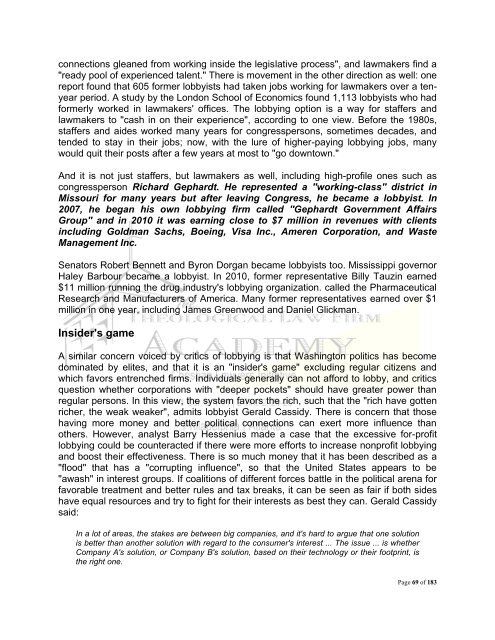The 508(c)(1)(a) Initiative Workshop
The 508(c)(1)(a) Initiative Workshop
The 508(c)(1)(a) Initiative Workshop
You also want an ePaper? Increase the reach of your titles
YUMPU automatically turns print PDFs into web optimized ePapers that Google loves.
connections gleaned from working inside the legislative process", and lawmakers find a<br />
"ready pool of experienced talent." <strong>The</strong>re is movement in the other direction as well: one<br />
report found that 605 former lobbyists had taken jobs working for lawmakers over a tenyear<br />
period. A study by the London School of Economics found 1,113 lobbyists who had<br />
formerly worked in lawmakers' offices. <strong>The</strong> lobbying option is a way for staffers and<br />
lawmakers to "cash in on their experience", according to one view. Before the 1980s,<br />
staffers and aides worked many years for congresspersons, sometimes decades, and<br />
tended to stay in their jobs; now, with the lure of higher-paying lobbying jobs, many<br />
would quit their posts after a few years at most to "go downtown."<br />
And it is not just staffers, but lawmakers as well, including high-profile ones such as<br />
congressperson Richard Gephardt. He represented a "working-class" district in<br />
Missouri for many years but after leaving Congress, he became a lobbyist. In<br />
2007, he began his own lobbying firm called "Gephardt Government Affairs<br />
Group" and in 2010 it was earning close to $7 million in revenues with clients<br />
including Goldman Sachs, Boeing, Visa Inc., Ameren Corporation, and Waste<br />
Management Inc.<br />
Senators Robert Bennett and Byron Dorgan became lobbyists too. Mississippi governor<br />
Haley Barbour became a lobbyist. In 2010, former representative Billy Tauzin earned<br />
$11 million running the drug industry's lobbying organization. called the Pharmaceutical<br />
Research and Manufacturers of America. Many former representatives earned over $1<br />
million in one year, including James Greenwood and Daniel Glickman.<br />
Insider's game<br />
A similar concern voiced by critics of lobbying is that Washington politics has become<br />
dominated by elites, and that it is an "insider's game" excluding regular citizens and<br />
which favors entrenched firms. Individuals generally can not afford to lobby, and critics<br />
question whether corporations with "deeper pockets" should have greater power than<br />
regular persons. In this view, the system favors the rich, such that the "rich have gotten<br />
richer, the weak weaker", admits lobbyist Gerald Cassidy. <strong>The</strong>re is concern that those<br />
having more money and better political connections can exert more influence than<br />
others. However, analyst Barry Hessenius made a case that the excessive for-profit<br />
lobbying could be counteracted if there were more efforts to increase nonprofit lobbying<br />
and boost their effectiveness. <strong>The</strong>re is so much money that it has been described as a<br />
"flood" that has a "corrupting influence", so that the United States appears to be<br />
"awash" in interest groups. If coalitions of different forces battle in the political arena for<br />
favorable treatment and better rules and tax breaks, it can be seen as fair if both sides<br />
have equal resources and try to fight for their interests as best they can. Gerald Cassidy<br />
said:<br />
In a lot of areas, the stakes are between big companies, and it's hard to argue that one solution<br />
is better than another solution with regard to the consumer's interest ... <strong>The</strong> issue ... is whether<br />
Company A's solution, or Company B's solution, based on their technology or their footprint, is<br />
the right one.<br />
Page 69 of 183
















